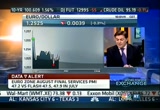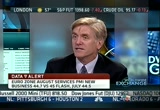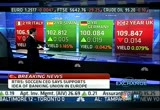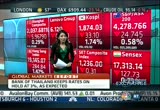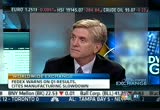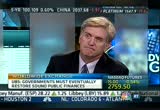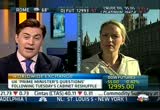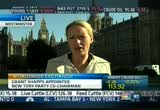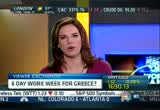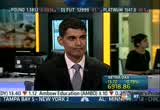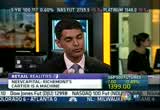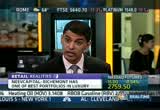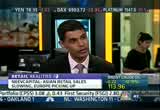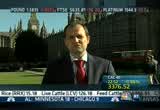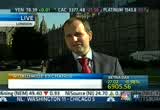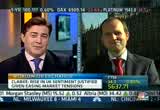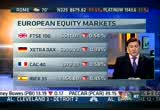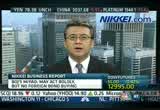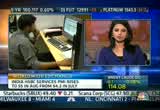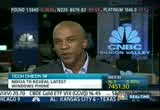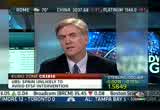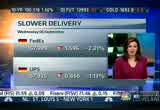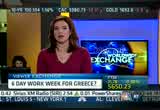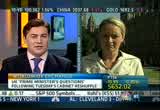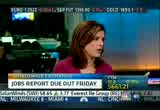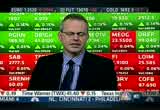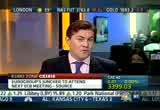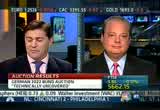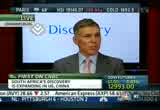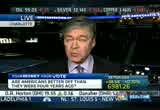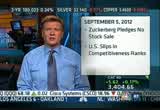tv Worldwide Exchange CNBC September 5, 2012 4:00am-6:00am EDT
4:00 am
. welcome to today's "worldwide exchange." i'm ross westgate. french and italian prime ministers pile on pressure to reduce borrowing costs as it shows continued sluch in services activity. fedex cuts lower earnings forecast. u.s. department of justice accuses bp of gross negligence over the gulf of mexico spill, blaming bp's culture of recklessness. thailand central bank says
4:01 am
they keep interest rates on hold at 3%. welcome to today's program. we're going to get straight to the data. >> and the data ain't that great. >> final services pmi today for the eurozone has come in at 47.2. flash number was 47.5. in july it was 47.9. final composite pmi, 46.6 flash point. eurozone likely to have stepped back into recession according to these numbers, if you do the read through from that. a seventh month of con tracks. new orders dwindling. august pmi slightly below earlier flash estimate. joining us with his own thoughts right now is larry hathaway at
4:02 am
ubs investment. thanks for joining us. whilst we wait for the ecb, the economics is getting worse. how much worse is the economics going to get? >> well, it is. it's confirming the recession that's been under way now and it continues. confidence is very weak. fiscal policy is being tightened. interest rates are very high in southern europe. all of those are contributing factors to the downturn, and therefore it's unsurprising we're seeing the data we've -- that's recently arrived here as well as in the united states. >> markets saying these figures point to eurozone contraction of 0.5% in qe. what's your outlook? >> it's in line with our numbers. we think for the full year the eurozone contracts at 0.4% rate, so not far off what you suggested and that seems to be consistent with the underlying data coming in. no real revisions just yet but we'll watch and wait. >> what about 2013, is that a
4:03 am
year -- 2012 we see europe broadly contracting. what about 2013? >> a lot hinges on the global environment. hinges on whether the u.s. can slowly grow and maybe grow a bit faster. whether china can begin to pick up steam. external stories can be critical for europe. >> larry will stay with us. let's check in and check out market reaction. >> one hour into european trading session. 73 declining outpacers. ftse 100 down 1.5% yesterday. down 0.5%. dragged yesterday by u.s. disappointing. the xet ra dax down 0.3%. ibex down after a good rise in
4:04 am
july. keep your eye on bond rates. yesterday we had a nice rally in spain on two-year. ten-year, 6.62%. that's slightly higher on the session, two days ago it was 6.8%. it has come down. ten-year italian yield as well. yesterday, 5.7%. let's show you the two-year because we saw yields coming down in response to comment from draghi to the parliament suggesting there's no legal problems with bond buying. spanish yields today are lower.. pretty much the level yesterday. two-year german, stig negative. new ten-year in german so we'll keep our eye on this. yesterday euro/dollar around the 1.26 moment. 1.25 at the moment.
4:05 am
aussie/dollar, 1.070. plenty will be going on in asia whilst we've been waking up this morning. we have the details from singapore. >> thanks. you're right, ross, it's negative picture across the board in asia following that downbeat manufacturing data from u.s. and slower growth for china's sector sector. shanghai composite loss 0.3%. the business jet sector outperformed as china's set to introduce new measures including building special airports for business jets around major cities. the hang seng finished around it's 40-day low dragged down by mainly banks and energy. lenovo shares tumbled.
4:06 am
nikkei extended its sell offfor the fifth day in a row marking its longest losing streak in two months. commodity stocks and machinery bore the brunt of selling. kospi was dragged down by sam hung electronics and hyundai motors. shares in thailand traded along the flat line just lower by a touch. central bank just released its decision to keep rates on hold at 3% as expected. and the australian market lost 0.6% despite solid gdp data with resources and banks leading the losses. sensex lower by 0.75%. >> thank you. >> that 0.6% expansion shy of estimates there. fedex is cutting its august quarter earnings estimate citing weak global economy. they say the shortfall comes
4:07 am
primarily from express division which handles an average of more than 3 million packages a day. analysts say customers are switching from overnight delivery to slower and cheaper methods due to poor economic conditions in europe and slower growth in asia. shares of fedex down about 2.3% in frankfurt trade. it's also weighing on rival u.p.s. whose shares are down more than 1% this morning. also warned similarly back in july about growth pressures. let's get back out for thoughts on this to larry hathaway. fedex, in particular, seemed to catch people by surprise, statement coming out in the u.s. last night. is this to you consistent with telling us what we already know happened over the last couple months or does it add renewed concern to the global picture? >> it's consistent with yesterday's weaker than expected ism manufacturing reports, the summer soft patch that seemed to reveil in the u.s. and also is part and parcel of what we see
4:08 am
in asia. after all, if you think about fedex and the kind of business it's in in transporting goods and services, boat around the country and around the world, one of the things that sort of is a link here is the very, very weak export performance of asian economies. so global trade has suffered as a result of the slowdowns we see in the u.s. and europe. >> it's interesting because the way they cite manufacturing, industrial production, we've seen those figures, whether it's the u.s. or other economies, be soft in the last couple of months. at the same time we're getting okay reads on perhaps the health of the consumer more broadly. is there a disconnect or perhaps we're seeing the slowdown see it work through the economy? >> there are bright spots, pockets of strength out there. the u.s. housing market is one -- >> the auto figures yesterday. >> absolutely. auto figures and u.s. consumer spending is holding in. but production itself is weak. again, the ism, pmi reports relay that. the trade data from asia
4:09 am
confirmed that data. inventory building is a concern in places like china. you have two tales at work here. for those that are involved in the transportation of items, that is of production-related goods and services, that's an area of weakness in the world economy. >> i imagine, you know, let's take equities, we priced in the weakness in europe. we probably priced in where we are in the u.s. have we priced in enough potentially weaker china? >> i think, yes, to some extent. after all, emerging markets, generally areas that are cyclical like materials have generally underperformed. >> emerging markets are maybe priced in. shanghai is down to a 3.5 year low. >> i think what developed markets have been a bit more focused on, to turn to that, is the advent of further easing in western europe. in particular, of course, with the ecb may announce tomorrow and then may execute later this
4:10 am
month. that's been, of course, the source of support for markets along with it has to be somewhat better than expected data from the u.s. even if it hasn't been all that good. china has been a little off center stage of late. the focus of marks has been on the cyclical stories in the u.s. and europe and policy -- >> i guess that's what i'm angling at perform china has been off stage. that might be the thing that comes back and -- >> it's a fair point, particularly if china continues to slow. >> good to have you on. another top story, u.s. department of justice will reportedly seek to improve in court the gross negligence by bp caused the gulf oil spill in 2010. reports they have fired a memo accusing bp of a culture of corporate negligence. bp says it will defend itself at the trial. they could face up to $20 billion under the clean water
4:11 am
act if a case of negligence could be proven. bp to date down 3.5% -- nearly 4% on the ftse 100. it's the worst decliner. obviously, quite a big drag as well. at the same time in britain today it's prime minister's questions which promises to be a heated affair after yesterday's cabinet reshuffle. a bit of change around on the deck chairs. what was the most meaningful move? people wonder if the change of transport secretary means we're focusing on airport expansion. >> the obvious reason to me out of that was the hard stance she took against the third runway at heathrow. from moving her from that job and putting in patrick mclaughlin, it clears the way for a government u-turn. he's reported to have an open mind about a third runway at heathrow. we shall see. the interesting point in this
4:12 am
reshuffle yesterday was the appointment of minister in charge of economic delivery. now, you may have heard this guy's name before,le paul dayton, a former government sacs banker and running the paralympics. he basically has been given a lordship and, therefore, will be in charge of this role where he's basically trying to deliver on the infrastructure and the economic promises the government has made. it's unpaid. he'll report directly to the chancellor. he said this appointment is one they find most exciting. it's not only a core cabinet job but something that's interesting for anyone watching the shape of the uk economy as it continues to develop. he's still handling the olympics and paraolympics and he won't
4:13 am
start until january of 2013. it would be handy if he was available before, but he's not. obviously, the top jobs as we talked about yesterday remain unchanged, cameron, clegg will remain in their positions and george osborne, and home secretary. other jobs are trailing around. chris grayling and clarke. new dynamic as this coalition government attempts to make on the promises. >> yes, a lot of skepticism around whether that new dynamic will change. i dare say paul dayton, delivering the olympics, however hard that job is, seems easier than trying to deliver some economic recovery. >> reporter: yes, indeed. pretty rough job for no pay as
4:14 am
well. not that he needs it as well. >> thanks for that. we'll catch you later. stay with us, in 20 minutes we'll be back in westminster to speak to an economist that says britain may be headed for a recovery. it need one. pore viewers in uk, we'll catch the prime minister's questions. leaked report by troika of a six-day work week as a condition on the bailout. is this fair or a going too far? let us know what you think. e-mail us at worldwi worldwide @squawk@cnbc.com. we continue to enj--
4:15 am
[singing] hoveround takes me where i wanna go... where will it send me... one call to hoveround and you'll be singing too! pick up the phone and call hoveround, the premier power chair. hoveround makes it easier than any other power chair. hoveround is more maneuverable to get you through the tightest doors and hallways.
4:16 am
more reliable. hoveround employees build your chair, deliver your chair, and will service your chair for as long as you own your chair. most importantly, 9 out of 10 people got their hoveround for little or no cost. call now for your free dvd and information kit. you don't really have to give up living, because you don't have your legs. hoveround replaced the legs. and now every hoveround comes with this handy tote bag and cup holder for access to your favorite items. and right now, get this limited edition hoveround america travel mug free with your hoveround delivery. [singing] hoveround takes me where i wanna go. call or log on to hoveround.com to find out where a hoveround can take you!
4:17 am
4:18 am
adding to speculation over what the central bank will do. turns out juncker will be attending that ecb meeting tomorrow, according to a statement from the group. also want to mention that societe generale saying their -- their ceo saying first of all he does not believe in a glass/steagall type of separation in banking and he supports a banking union in europe. something we'll hear more about on september 12th. it's not just watching apple's next product launch we're also waiting for this banking proposal. >> juncker, what is he going to do? >> it's okay. >> say it's okay, don't worry? >> it's interesting to see
4:19 am
juncker coming on poerd. you can only read it as, perhaps, putting more pressure on those more hawkish officials. >> you like this next subject. >> luxury. >> swiss luxury giant has reported a bullish outlook after a 13% rise in sales for the first five months, citing solid growth in europe and china. we have more details out of details. how did this compare with what analysts were looking for? >> well, more or less along with expectations. i guess that's fair to say. richemont up by almost 1%. expectations were pretty high, yes, but we knew that. last month they said it expects operating and net profit for the first six months of the year to rise by between 20% and 40%. we knew this was going to be a solid set of numbers. ross, let me just give you the regional breakdown because europe, in fact, was the best
4:20 am
performing region with 19% sales growth. that's local currencies. the main reason being tourists from overseas spending -- or splurging on very expensive watches. there's a lot of concern about chinese consumer slowing down. yes, we did see a slowdown in growth but still very healthy at 12% in the months between april and august. overall, richemont remains very bullish about the rest of the year. back over to you. >> thanks for that. joining us in studio, rujal founder of nive capital. thanks for joining us. is richemont typical of the luxury sector? the whole sector being shielded better than others? >> it is. having said that i think there's a lot of concern about china and luxury and too much focus has been placed on mainland china.
4:21 am
where growth is being normalized. people miss how strong europe is. what's happening with a lot of wealthy chinese, they travel a lot, the euro is weaker, taxes are lower, fashion is fresher and a whole lot are coming in. not just chinese, shoppers from emerging markets coming here, picking up luxury goods. if you combine that with what's happening in mainland china you get a healthy look. >> it's china, wealthier emerging consumers looking, the same way companies used to take a look at tax situations. now you're seeing consumers play the same game. >> that's exactly right. if you factor that in, they're doing just fine. the other thing i would say that's different about richemont and hermes -- >> herm was a standout number. >> absolutely. what you're seeing is the chinese enduring faster than what western shoppers ever did.
4:22 am
what i mean is they already know when the iconic exclusive brands are. they're seeking out exclusivity. it's no surprise that hermes, cartier, richecmont are seeing o slowdown. >> all in all i think the outlook for many stocks is healthy. i think you have to be a bit careful because growth is normalizing for some of these names after two, three years. where you want to look is where you have a healthy outlook in term of sales growth coupled with -- richemont is one of the best portfolios, aspiratioaspir huge asian growth and very reasonably valued. >> seems to me what i'm hearing is that this segment of the market is sort of defensive bling. in other words, it doesn't really matter u.s. or eurozone
4:23 am
is going through problems. this is a steady demand story and increasing demand story. is that right? >> there's an element to that. with this space you have to be careful because wealth matters to these people. if you see a horrific event in stock markets as happened in 2009, then all bets are off n a way. as long as we tumble along, absolutely. the other thing i would highlight, it's not just china. there are markets beyond china, india, the u.s., frankly. the u.s. is an emerging market in some ways for luxury. u.s. shoppers, the penetration of true luxury is really low in the u.s. as compared to europe. >> you make a point about true luxury. this is a business that's about brand management, isn't it? it's hard -- you can't get new entran entrants. you can't suddenly create a brand with lots of heritage. the business is actually making sure you don't mess it up, you don't mess the brand up.
4:24 am
>> very much so. it's all about scarcity, about pricing power. another interesting point, this is why euro brands, european brands have done better than american brands. with asians they carry a longer history, longer legacy which is why the likes of which ralph lauren is doing a phenomenal job with his brand but doesn't have the same cache as an hermes does because he doesn't have the history. >> you also mention that accessories have done quite well and a focal point but some clothing companies, apparel companies, ralph lauren, burberry? >> yes. the big brands are moving away from apparel because they're trying to push level, which opens up a wide space for likes of ralph lauren and burberry because no one is doing luxury apparel on a large scale. >> it's interesting because you also talk about liking companies like volkswagen and whole foods,
4:25 am
which cater to the same demographic. >> exactly. the definition of luxury is stretching because the fact is german car brands, for example, are hugely aspirational in emerging world. you're seeing more vws valued -- >> with great respect to vw, and i mean -- look, i've owned vws but no one would refer to them as a luxury car brand over here. >> but most -- i'm not talking about vw brand. most vw's value comes from porsche. if you look at bentley, porsche, audi, that is a killer portfolio of luxury car brands. it will never be rated the way a true luxury -- >> because they're a bit too big. >> not just that. also the perception these are the car companies far more cyclical than anything else. there's that element, too. >> thank you. good to see you. ruhal, founder and founding
4:26 am
director at neevcapital. we'll get a closer look at sector with a special look at london fashion week and speaking to the biggest in the business including vivian westwood. that's all next week on cnbc. i don't know how they walk in those shoes. >> i think we should have you try. australian dollar is staying near six-week low despite data showing more than two decades of uninterrupted growth in the country. we have this report from sydney. >> reporter: economic growth in australia was still solid in the second quarter but did disappoint coming in at 0.6% quarter on quarter. household consumption, government spending staying strong in the quarter but concerns are prevalent when it comes to falling commodity prices, especially iron ore. treasurer trying to ease some of those worries today. >> we have seen some recent falls in commodity prices. of course, we know we've had a
4:27 am
sustained higher dollar. and we know that that has weighed on some investment decisions. particularly for early stage projects. but none of these things, none of these things diminish the enormous amount of investment that has already occurred or the record $260 in the resource investment pipeline that is at an advanced stage. >> and it's not going to get any easier. economists say the second half going to be much more challenging. back to you. >> over here in the uk, martin wheelie of fsa has been speaking in london about incentive schemes. he says some schemes banks encourage mis-selling of products warns new rules are being considered. what i did see him write about this, he says there was a time when you walked into a bank and it was about service. hes now you walk into a bank --
4:28 am
>> it's about pushing products. it's oversimplified. it's a bank. it's always about sales. i thought that was an oversimplification. >> but this is the guy regulating them. still to come on the program, india service sector showing signs of resilience. it is enough to convince the rbi to relax tight monetary stance.
4:31 am
these are the headlines from around the club. french and italian prime ministers reduce borrowing costs as the latest data out of the eurozone shows a continued slump. fedex cuts already lowered forecast. shares in bp are down as the justice department accuses them over gulf of negligence over the gulf spill. gdp in australia at 3.7%. normally, of course of course at this time we would be breaking uk pmi data but it came out early because of a mistake. the latest batch shows service
4:32 am
activities increase in august as companies won new contracts. next guest says as long as the ecb follows through and gives them a treen maintain improved mood, britain may be headed for rove. alan, thanks for joining us. it was a surprisingly stround bounce back on services number when it got prereleased yesterday. it even beat your forecast. you were the most bullish man out of the range of analysts. what do you think of it? >> it's no accident this survey did well. ten-year government bond yields picked up. it's telling us financial sentiment is doing better. this is a survey of sentiment, it's picked up as well. the good news is when some of the fiscal jitters calm down, our survey can revert to where they should be and they should be going higher. >> is the uk in the third quarter going to be out of
4:33 am
recession? >> yes, but it's sort of cheating a little bit because we are the reaction from the extra bank holiday in q2 and helping hand from olympics. the test is q4, q1 but i think it's upward. >> can you square that with the especially weak construction report we've seen and some other indications broadly that the economy isn't exactly flexing its muscles? >> in construction, it's a random number generator. up 10% one month, down 20% another. i'm a huge view if you strip out the effect of the bank holiday, strip out construction data and underlying gdp territory, it's in positive territory by.25%,.50%. of course, take out all the bad news and it's good news. >> we've seen a cabinet reshuffle. we heard various plans to try to get the uk economy going owe the last week as government gets back from summer recess.
4:34 am
is any of it going to add up to very much? >> i don't think so. the biggest problem europe faces is pressure. he may try to make the best of a bad situation. for me, the biggest headwind is that dark cloud coming from europe, holding back consumer confidence and business confidence below where it should be if mario draghi and his buddies can finish that, then happy days. >> you're sounding just like the chancellor and the prime minister when you say that. >> that's why i wore my red tie. we're still at the same problem. we have lots of borrowing, the benefit of the doubt at the moment, the markets, the rating agencies. maybe we can stray in the direction of labor and give it a little more of a helping hand. i think for osborne and his team that would look like they're conceding defeat. >> do you agree with alan it's in the hands of the eurozone
4:35 am
or -- >> i think it is. it's very hard here to generate much activity right now. olympics are out of the way, which may have had mixed blessings for the underlying economy. this is an economy stagnant, fiscal tightening is still posing the drag and the external environment is absolutely critical for sentiment and for real economic activity. >> okay. alan, thanks for that. good to see you. larry sticks around for more. european stocks half an hour into the trading day, building on losses from yesterday. we'll take a look at the mood across bond markets and see if that keys the same thing we're seeing yields in spain and italy moving higher. ten-year in italy, down 0.1%. interestingly, ross, despite the we've heard this morning,
4:36 am
juncker will be attending the ecb meeting on thursday. that would seem to spur speculation there might be more significant announcement or action to come from the central bank. nevertheless, we're seeing a risk-off attitude across markets. >> euro/dollar, down to 1.25 flat. aussie/dollar, eight-week lows on that cross. japan's ruling party is drawing up a new course of action for the bank of japan. central bankers, though, aren't always in a listening mood when it comes to politics. we have this story from the nikkei live from tokyo. >> the ruling democratic party of japan may call for the country's central bank to buy foreign bonds in a bid to boost the economy. the proposal is part of the dpj's new policy platform nor the next lower house election which could take place as early as november.
4:37 am
while some boj board members are believed to be in favor of foreign bond purchases to address the strong jen yen, foreign minister has been reluctant, so has another board member. at a news conference today, he ruled out the possibility of buying foreign bonds. he explained the action would have the same effect as currency intervention which the central bank is forbidden from doing. such moves fall on the plate of the ministry of finance. without hints of easing, he hinted the central bank will continue to act through the asset purchase program. back over to you. >> thanks very much for that. shifting our attention to india, services industry there grew at its fastest pace in six months in august. that's in contrast to the weaker data we've seen out of europe this morning. we have the details on this live from mumbai. a firmer read there? >> reporter: thanks for that. it is a built of a relief this time round for services pmi.
4:38 am
this is the month of august i'm talking about. so it has been the fastest pace in terms of improvement in the past six months for services pmi data, indicating that above 50 is not a contraction, and that's the level it's been holding since november 2011. just to put things in perspective, it is above 50 since november 2011 and this is the highest level it's come at in the past couple of months. this actually compares to the manufacturing pmi, which came in just a few days ago. that came in at the nine-month low. but it was above 50, indicating that it is still expansion but definitely slowing down in the manufacturing sector. the composite in terms of pmi came in although 53.3 versus 54.4 dragged down by manufacturing pmi. what does this exactly mean? remember that the hsbc pmi is
4:39 am
just an indicator along with other macros we work with, as well as most recently now the gdp that came out for q1 where we saw services data slump below 7% for the first time in many, many months indicating services is actually slowing down at this point in time. let's see what sort of data points we can possibly counter up for the remaining part. fiscal which will help in term of gdp. otherwise, a positive for hsbc's pmi this time around. let's take a look at what's on the agenda in asia tomorrow. south korea issues revised second quarter gdp numbers. that's 1 a.m. central european time. malaysia's central bank will announce latest decision. and the boj will talk about the economy, 4:40 a.m. central european time. you want to get in touch e-mail us worldwide @cnbc.com.
4:40 am
tweet us. we move on to agriculture. wheat prices have eased as rains in u.s. have improved prospects for winter planting. according to market retail who controls the lose dreyfuss group, south america will remain a beneficiary of the u.s. summer drought until the end of the year. carolyn is in europe. >> reporter: it's safe to assume market retailer lose dreyfuss knows a thing or two about the latest trends because dreyfuss commodities is one of the biggest traders in the world and global number two in wheat, corn and sugar trading and she tells me farmers in brazil and argentina are ramping up production to fill that supply gap caused by american drought. >> at this time i would say it's south america because russia had also drought this summer.
4:41 am
it is definitely brazil and argentina. >> reporter: you talked about the drought in russia. in terms of the harvest outlook in term of exporting countries in terms of grain, do you think prices in grain are here to stay for the rest of the year? >> yes, i would say so, yes. >> reporter: so, we're going to be close to record prices for the rest of the year? >> for this year, it will be dwil. i mean, i don't know the prices but it will be -- they will be high. >> reporter: many people talk about or use this term, soft commodity super cycle. are you comfortable with that term? do you think this is an environment we're currently in? >> i would not call it a super cycle because of the gross overpopulation, we have to feed them. it's a natural process. it's not a super cycle. >> reporter: and keep in mind that louis-dreyfus commodities,
4:42 am
speculation they are planning on ipo because much the elevated grain prices and soft prices. i asked her about that and she said there are advantages and disadvantages. she made an interesting comment with regards to inflation and a potential food crisis. she says the havbest will yield enough for everyone. we're innocent a panic situation. does not think we are headed into a food cries. apple sent out media inhave i tensiinvitations for septembe 12th. the e-mail invites read, it's almost here with the number 12 casting the shadow of the number five. you can figure that one out at at the same time, the fbi has denied claims from a hacking group that it stole 12 million apple i.d. numbers from an agent's laptop. the latest numbers from com
4:43 am
score remain samsung remains the top manufacturer in the u.s. even though market share dipped while apple saw a slight gain to just over 16%. that's quite a jump from 14.4%. meanwhile, another wave of new smartphones, tablets and other devices will be hitting the market over the next few weeks. nokia kicks off things today unveiling first smartphone based on windows 8 software in new york at 9:30 eastern. motorola takes wraps on what analysts believe will be a droid razor hd phone. as far as all those relevant stocks are concerned, nokia currently down nearly 3% in finnish trade. microsoft up, 0.75% in frankfurt, google barely up in
4:44 am
frankfurt. jo john fortt has been following this story. >> reporter: two big events, nokia and microsoft, running windows 8 operating system from nok nokia. they're in multiple difficult colors. the rumor is they charge wirelessly. all from leaks that have come out so far. i'll be sitting down with nokia ceo first after the event to find out how confident he is that these new phones can lift nokia's fortunes, boost market cap above this $10.5 billion level near all-time lows for the company. it has rebounded a bit over the summer. and then after that, google's motorola mobility unit will have an event. we expect to see new phones there, new razor phones, perhaps one with an edge-to-edge screen. that would be the headline dwight we could see out of that event. it will be interesting to see how they position motorola
4:45 am
mobility. could lower margins if google doesn't successfully sell a bunch of phones through this unit. i'll be at both and then tomorrow at l.a. for the amazon event with the new kindle. watch cnbc for all of that. back to you. >> laying it out for us. so much going on. i don't know how you keep track, all the different new models coming out. >> i will say this is described as a make or break day for nokia. the shares have struggled, the company has struggle but this partnership with microsoft with windows 8 coming out in the fall. with-f that product launch goes well it could be a turning point for the company. at the same time we have analysts cautioning the old wintel has been totally undermined by the shift we've seen toward apple products. >> brings you back to how regulators are always too late.
4:46 am
they talk monopolies, just allow competition, which kind of -- >> they're finally going after the two big guys as the market is moving away from them. nevertheless, the iphone 5 is expected to be a big deal for those kinds of people, unlike us, who rush out and buy them when they first come out. >> i don't know how you know what the latest and best thing is. >> meanwhile, we still have blackber blackberrys. >> you're with the right people, larry. just stay with me. i can't speak for kelly -- >> same. absolutely the same. still to come on the show, jean claude juncker is attending tomorrow's ecb meeting 37
4:49 am
. french president and mario monti are increasing battle against higher borrowing costs. the leaders used a joint news conference in rome to add to mounting pressure on the ecb to bring down the cost of refinancing for the eurozone's troubled economies. this is -- we understand euro group jean claude juncker
4:50 am
will be attending the ecb meeting tomorrow. i mischievously said he was going to say, don't worry, it's not going to be that bad but what is he going to be doing? >> well, i wonder. first of all, probably to add a little weight to the seriousness of the situation. maybe to urge ecb to buy politicians more time and to assure the ecb if you're buying us more time, we will deliver because so far the ecb has always said, come o we've bought you time, we bought you time, we put more money into the banking system, and what are you doing? you're dithering. deliver, implement, whatever. that hasn't happened. they have to say in the good old day of the bundisbank, whenever a chancellor showed up to urge, whatever, the bundisbank did the
4:51 am
opposite of what the chancellor want. of course, there are a number of issues. the bond buying program, bond purchasing program in the cards, what the senior monti and mr. hollande said yields are not in line with economic realities. are they really? remember where yields for spanish, italian, french bond were before we headed into the eurozone and they would be sing examining dancing if they had been as hoe as they are in inverted commerce. we caught up with some very academic important men in german, the academic mentor, and asked him some of these questions. for example, what the esm should look like and what the ecb could or could not do. here's what he had to say. >> the problem is that a change,
4:52 am
the old friend of policymaking because up until now it was forbidden -- it was a rule not to buy bonds and you understand when they started in 2010 is, well, we have to buy some bonds simply to keep the market floating, to keep them flexible. but meanwhile, it's clear, this is not the idea. so, now the idea is simply to support governments. >> one of the problems of massive bond buying programs is that it knocks the whole market system out of sync, so to speak. it's much easier for governments to buy bonds. this is what the professor also warned about. >> the banks are really financing the governments at this time. and you see there is also specialty because if a bank gives a loan to a private company, then they have to have
4:53 am
capital. if they gave the same amount to some government by buying their bonds, they don't are to keep capital so it's nice business for the banks to finance governments. >> he thought it would be disast disasterous to give the ecm a banking license because they could make monetary policy ineffective. i disagree with him. it would be a very dangerous move. >> stay with us. we'll bring in larry on that point. the comments are he exists the euro gloen to exist in the same form a year from now. over all those threats of greece exiting, maybe he's suggesting they'll get the money. i don't know what you read it that way. what about ecb and a banking license. >> i don't think it's a
4:54 am
particularly good idea either. i think it would undermine the role the ecb would play but we've superseded that. ecb is widely expected to engage, buying the front end of the curve of these countries, provided, of course, they adhere to some memorandum of understanding and that take as way the need for -- >> is that a foregone conclusion, spain gets the right agreement on conditionality that says they will ask for some assistance? >> let's put it this way. it's not a foregone conclusion but expectations have arrived at that point. if they are disappointed in either -- either on thursday or, of course, in the coming weeks, as spain presumably prepares its memorandum of understanding, the markets are going to suffer a fairly significant setback. >> sylvia? >> it at the point whoever blinks first? ecbes conditionality, which means countries we support in massive bond buying in the front and has to have some kind of memorandum of understanding, have to ask for some kind of bailout.
4:55 am
and the spaniards and the italians presumably are still holding out against that and then the ecb won't buy? >> two issues i would address. the first is that this is unprecedented as far as i can tell in central banking. that a central bank itself would require a memorandum of understanding to engage in purchases of its bonds. after all, the fed or bank of england, bank of japan buy them for simple monetary purposes rather than for some kind of quid pro quo. i find that a dangerous path to go down because it's not clear to me that the ecb could enforce a memorandum of understanding if spain or some other country weren't able to deliver on it. the second point is whether countries like spain or italy are prepared to go forward with that sort of a commitment. after all, it implies some loss of sovereignty over thing like fiscal policy. so far spain has been reluctant to go down that route. there's a loss of prestige.
4:56 am
one can see him putting pressure on spain that are responsible for the size of the deficit in that country but that's a fairly interesting game of political calculus on his part. you can argue monti might go that route because he would like to tie the hands of his successors. he's a technocrat, unelected and at some point he would depart the scene and you would like to have him place fairly binding commitments that they would not deviate from the path he set out. >> he might -- he might go into politics when he steps down. you don't know. spain has got to refinance -- goz to rate $40 billion over the next two months. >> very difficult to do without some commitment on the part of the ecb to be part of that buying activity. after all, we know a lot of fund managers have effectively banned that from the portfolios. underlying demand for these is not what it was. >> banks have stopped buying? >> indeed.
4:57 am
capacity is not necessarily there to absorb that kind of supply. >> larry, good to see you. thanks for joining us today, managing director and chief economist at ubs investment bank. sylvia, thank you. we'll catch you later. coming up on the program, fedex is feeling global growth concerns. the delivery giant cut it's outlook and warned in ongoing concerns in manufacturing sector.
4:58 am
at merrill lynch, we understand the importance of your goals. today, our financial advisors lead from a new position of strength. together with bank of america, they have access to more resources than ever before. a steadfast commitment to help you achieve your financial goals in life. that's the power of the right advisor. that's merrill lynch.
5:00 am
welcome back to "worldwide exchange." i'm kelly evans. >> i'm ross westgate. here are your headlines from around the world. fedex cuts already lowered earnings forecast warning on the sharp decline in global manufacturing activity. bp shares in london. the they accuse bp of culture of recklessness. french and italian prime ministers pile on pressure for ecb to help reduce borrowing costs. latest data out of the eurozone shows continued slump in services activity. plus first lady michelle obama fires up the base in the democratic national convention, making the case for voters to give her husband a second term
5:01 am
in office. let's check in on markets as we sort of near the beginning of the u.s. trading session. dow jones industrial average sitting below that 13,000 mark is looking to open lower, taking fair value into account by about 35 point. nasdaq, s&p 500 are also in the red this morning a bit of a bigger move than we've seen with indecks in the last couple weeks. part keying off attitudes we've seen in markets overnight. let's take a look at cnbc ftse 100, down spurred by parts of asian demand, the fedex profit warning we've talked about, or change in guidance, that is, european markets for their part
5:02 am
are also in red. ftse 100 down despite better tone. xetra dax down 0.3 trs. it's unusual for us to see all the vorcies doing the same thing. >> that eurozone pmi is coming out, nudged down from the flash number. what's the impact on the spanish bond yield? they are lower than we were two days ago. we start off 6.61% is where we stand. italian lower than where they were, 5.71%. the big move on two-years yesterday, post the discussions draghi apparently had with meps suggesting there was going to be a bond-buying program. spanish yields today are slightly higher, 3.25%. and in italy, 2.81%. there's been a big rally in the two-year. if the ecb are going to do any buying it would be at the
5:03 am
shorter end. a lot of conditionality attached to that. euro/dollar, right now trading at 1.25. dollar/yen steady. the aussie/down to an eight-week low. second quarter gdp, 0.6% in australia. less than -- weaker than expected. now thoughts maybe the reserve banks will start cutting rates. sterling/dollar steady. let's recap the asian trading day for you. the asian vorcies retreat following data from u.s. and china. gains in developers were offset by losses and steel makers on oversupply concerns. but business jet makers rallied as china is going to promote the sector by building special airports for businesses around the city. hang seng had worst showing in
5:04 am
six weeks dragged down by energy. lenovo shares tumbled after the japanese i.t. firm sold down entire 2.7% in the chinese pc makers. losses in commodity stocks and machinery sent nikkei lower for the fifth straight day marking its longest losing streak in two months. south korea's kospi was dragged down by heavyweights by hyundai and samsung. ship builders lost ground ahead of tomorrow's ecb meeting. shares in thailand lower by 0.3% at the moment. the central bank decided to keep rates on hold at 3% as expected. the australian shares lost about 0.6% despite relatively solid gdp data with resources and banks leading the losses. india's sensex lower by 0.6%, weighed down by banks and technology shares. back to you. >> thanks very much, indeed, for that. into the second hour as we count down to the start of the u.s. trading session today.
5:05 am
what are you -- >> i think it's the juncker news that's most important, that he'll be joining the ecb meeting tomorrow. fueling speculation of anything from him just there to exert behind closed door presence to perhaps be involved in a bigger announcement. as we've seen with the ecb, houcht during this crisis, expectations ramp up, ramp up, ramp up, and fail to deliver. >> the ecb action is dependent on assist apt from spain and that assistant would also come via esc and imf. so they are getting their ducks in order. >> you also know it's this game of brinksmanship, even with spain. as we see pressure on greece to do a six-day work week, for example, spain doesn't want to have to agree to the same conditions, but without that there may not be any agreement for aid. in any case, moving now to some concern about the global growth picture more broadly, fedex cut
5:06 am
earning estimates citing weakness. they say the shortfall comes primarily from express division which handles an average of more than 3 million packages a day. analysts say customers are switching from overnight delivery to slower and cheaper methods due to poor economic conditions in europe and slowing growth in asia. that's hit shares of fedex and rival u.p.s. which issued a similar warning back in july. fedex down better than 2% in frankfurt trade this morning. decline of 1% for rival u.p.s. joining us on set is david simmons, u.s. economist at standard chartered. welcome. >> thank you for having me. >> let's talk about this news out of fedex. what implications you think it holds for global growth. >> fedex is generally a pretty good bellwether for the u.s. economy as a whole but also for global economy. we've seen the pmis come down in the second quarter anyway so this shouldn't come as too much of a surprise. the fact it's below guidance is concerning for the stock market. it is a good indicator go ahead
5:07 am
forward. we had singapore's pmi because they are open market and they announce pmis fairly on. >> that's interesting. i love looking for these gauges, growth gauges. you mentioned now we're seeing several, singapore pmi, fedex, things people like to listen to. >> we had gdp number last week for second quarter and it's not all bad news. we're getting mixed signals things are not as dire as people think. >> is this pointing toward further weakness or telling us what we knew about the last couple of months? >> from the u.s. perspective, things are looking a little better than people felt they. over the last six weeks the outlook has improved and it's gone from the feeling we were on the edge of the abyss, even
5:08 am
though the outlook isn't particularly exciting but it's not as concerning. >> how does employment play in the tone of slightly better data, notwithstanding the ism yesterday? >> the one we had last month was 163, which is much better than people were looking for. the problem is you need a consistent trend. this friday's data is everyone has around because it's the last major data piece we have before the next fmoc meeting. i think the market is feeling it's in line with expectations or even better, you're unlikely to get any action from the fed. you're more likely to get those talking. if you get a particularly poor number then people feel the fed is going to come in. focus is very much -- it's an all or nothing event. >> all right. david you're here for the next 20 minutes. more to come from you. live pictures from south africa. more than 1,000 striking miners at platinum mine where police
5:09 am
shot dead 34 of their colleagues last month. we'll keep our eyes on that developing story. u.s. department of justice is reportedly seek to prove in court gross negligence by bp caused the gulf oil spill in 2010. reports say government lawyers have filed a memo accusing bp of a culture of corporate recklessness. bp denies gross negligence and says it looks forward to defending itself at the trial in january. "the final times" says bp could face penalties up to $21 billion under the clean water act if a case of negligence can be proven. as far as the stock, down 4.3% lower. somewhat of a drag as well on the uk market. as far as what's on the agenda in the united states, second quarter productivity out at 8:30 eastern. forecasts calling for 1.9% growth. unit labor costs have seen
5:10 am
rising by 1.4%. corporate side, discount retailer dollar general reports figures before the open. after the close we'll hear from the likes of h&r block, harry winston and menswear house. that's the agenda for you today. meanwhile, a leaked report from troika suggests imposing a six-day work week on greece as a condition of bail outs. we want to know, is that fair or is the troika going too far? jeff tweets in to say, no, six-day work week is not fair. don't punish workers for government's mismanagement and stupid. join the conversation here on "worldwide exchange." get in touch by e-mail or tweet us @cnbcwex or individually. ross? >> do that and still to come, david cameron is under spotlight as he faces questions in parliament following yesterday's cabinet reshuffle. >
5:13 am
5:14 am
slump on the eve of a key ecb meeting. and michelle obama firing up the base at the democratic national convention. those are the head lines. today in britain's prime minister questions the first one since the summer recess it promises to be a heated affair after yesterday's cabinet reshuffle. becky joins us for more. there's been sort of the idea the government wanted to get on the front foot ahead of the start of the new parliamentary sessions and prove they are doing what's necessary for growth. how do you think it's going down? >> they're halfway through parliament, about 2 1/2 years into the possible length of this current government. they're saying this phase of government they're moving into is delivery. that's what they're trying to get across to the electorate. prime minister's questions today, it will be interesting to see how opposition react to
5:15 am
that. mi miliband will have a chance to go head to head with david cameron on these issues but they're trying to position themselves in that kind of way. obviously, economic growth is one of the key factors there. osh lack of economic growth. one of the interesting appointments this time around has been paul dayton. s has been appointed as minister in charge of economic delivery, or official title is commercial secretary to the treasury. he's a former saks banker and ceo of the organization that delivers the olympics and paralympics so he's done well. basically, he over the next couple of years will be trying to manage the 30-year national infrastructure plan that was published a couple of years ago. when with spoke to extive general at cbi said he was excited about that about this appointment, which is unpaid, can inject more impetus into the
5:16 am
economic growth strategy. >> thanks for that. we'll see what happens. i dare say how difficult delivery the olympics was. i have a feeling delivery an economy in the uk is a rather tougher job. >> and he's still busy so he can't start this until january 2013 which needs to be started sooner rather than later. >> thanks for that. the financial watch dog in the uk is planning new rules to clamp down on mis-selling of certain bank plans. managing director of the fsa martin wheatley said improper incentives were giving rise to market abuse. >> people in financial institutions are encouraged through incentive schemes, bonuses, rewards. we have evidence of poor practice. we're concerned this reward culture that has developed is a significant contributor to
5:17 am
mis-selling. >> other stories, the world's largest gas producer, gas prom has been accused of using its position to hinder practices. they say gazprom's behavior could have harmed eu consumers by raising prices and threatening the security of supply. facebook says ceo mark zuckerberg won't be selling any of these hairs for at least a year. board members andree son and graham will only sell enough to cover taxes. these moves come as facebook waived a provision from selling employees from selling mid-september. as you can see there, facebook shares down another nearly 2% in trading yesterday, hitting a low not seen since its ipo, 17.73 after two analysts cut their price targets. coming up next, has the
5:18 am
crisis changed american spending habits? we'll look ahead to dollar general. as we do that, reminder where we trade in europe. you can see we are weighted to the downside. advances being outpaced by decliner. [ male announcer ] how can power consumption in china, impact wool exports from new zealand, textile production in spain,
5:19 am
and the use of medical technology in the u.s.? at t. rowe price, we understand the connections of a complex, global economy. it's just one reason over 70% of our mutual funds beat their 10-year lipper average. t. rowe price. invest with confidence. request a prospectus or summary prospectus with investment information, risks, fees and expenses to read and consider carefully before investing.
5:21 am
we're weighted to the downside on europe stocks. here's a look at u.s. markets. we're implied weaker at the start. s&p down 4.5 point. dow down nearly 26 point at open. nasdaq down 11. >> this comes, by the way, as dow jones has neared that level of doubling from march 2009 lows. 8% off all-time highs. citigroup pointing out its complacency index is back at -- >> that was a generational low. it was a good phrase. u.s. discount dollar general report second quarter earnings before the opening bell and courtney reagan has been head to what we might expect. >> reporter: dollar general has met or beaten wall street estimates the last 23 quarters. analysts are looking for 64
5:22 am
cents on $3.96 billion in revenue. that represents a 23% increase in profit yooeear over year. about three-quarters of dollar general's merchandise is food. it's a low margin, highly competitive space. deutsche bank notes niche grocers like whole foods and trader joe's take the shares from walmart to dollar general. over the last couple years dollar generals and competing dollar stores began to pull in consumers from walmart and target for groceries however target's fresh food initiative has taken hold lately and may ruin the momentum. the street will watch for that. shares of dollar general are up more than 22% year to date, a stock perform that's true has outperformed the s&p and dollar tree and family dollar but underperforming walmart and target. back to you. >> david simmons, u.s. economist at standard chartered is still
5:23 am
with us. david, thinking through dollar general but also this news wall matter is lowering layaway prices from $15 to $5, after a move by toys "r" us, overall consumer picture has been good but are we overlooking weakness in shoppers in. >> the main problem if you have a job in the u.s., firm income growth given how the economy looks but if you haven't got a job, then you're getting left behind and, unfortunately, people's unemployment benefits are running out. you have a huge disparity between people who are employed doing okay to well and people who are unemployed really suffering. >> that explains the dichotomy with consumer confidence figures with some measures pointing to more weakness than we've seen on the spending front. >> right. if you look at consumer expectations which is the measure that captures how people will spend, that's been edging down. you've seen spending actually picking up this year.
5:24 am
this year hasn't been fantastic but better than people have noticed. we feel the outlook for the consumer has been acceptable and people have been very downbeat about it but it's slow and steady growth. it's not going to capture any headlines but it shouldn't concern people the way it has been. >> what's the new trend for consumer? so much of it was credit-driven and taken equity out of homes and stuff. what now should we pencil in as the new sustainable level of consumer spending and then we can work out how that figures into gdp. >> we're looking for around 2%. people need to save more. calculate savings in u.s. it's your income minus spending, and savings takes into account people paying down debt. people who have built up a rather large debt overhang need to pay that off. it's picked up from 2% to 4.2% this year, which given the relatively benign income growth around 2.2%, 2%, whatever
5:25 am
measure you look at, it's a reasonable pick up. >> what they're doing is paying down debt with a lot of that money that isn't being spent which isn't going to necessarily put them -- it's not going to support the economy. it's going to take years to flow through. >> it's better they do that and then in the long term they don't have to service credit card or mortgage rates -- >> does that savings level need to be higher? we heard during the crisis people calling for an 8%, 10% savings rate. % back in the early '90s. is your view we need to move higher from here? >> ideally you want it to be higher because for longer term, a good impact on longer term investment but at the moment people need to keep saving and u.s. consumer is the main driver of the global economy in terms of the absolute number of percentage of growth. it's not the major driver of growth. >> one of those dichotomies, but as everybody does it, it has a negative -- >> it's a paradox effect,
5:26 am
obviously. you don't want them to save too much but you don't want them to save too little. >> real quick, where do you expect the unemployment rate to be both if friday's report and by the end of the year? >> we're looking for it to say at 8.3%. looking for nonfarm payrolls to come in not weak enough to concern the fed. >> no -- >> we're not looking for qe3 to come. >> we'll see how markets react on that. david simmons, thanks for stopping by this morning. moving now to tech news. apple sent out media invitations to an event on september 12th when widely moved it will announce a new iphone. the e-mail reads "it's almost here" with the number 12 casting the shadow of the number 5. meanwhile, latest figures from com score shows samsung was the top manufacturer in the u.s. apple saw a gain to over 16% market share. meanwhile, another wave of
5:27 am
new smartphones, tablets and other devices hitting the market. nokia kicks off things when it unveils its new phone based on microsoft windows 8. a few hours later motorola takes wraps off analyst predict will be a droid razor hd phone, motorola's first product since being bought by google. stocks in various companies, nokia is down 3% in finland. microsoft and google in frankfurt up. >> interesting to see nokia move lower in trade this morning. last time we checked in it was less than 3%, now greater. >> the decline is worse. still to come, the latest german bond auction results. getting a whopping there of 1.5%. >> sound great in this environment, practically. we'll also take the pulse of the global health care sector. we'll have the ceo of south african insurance giant discovery holdings.
5:30 am
welcome to "worldwide exchange." if you're just tuning in, i'm kelly evans. >> i'm ross westgate. slower delivery. fedex cutting already lower earnings forecast warning on a sharp decline in global manufacturing. u.s. department of justice accuses bp of gross negligence over the gulf of mexico spill blaming bp's culture of
5:31 am
recklessness. french and italian prime ministers pressuring the ecb as latest figures show slump in manufacturing activities. michelle obama fires up the base at democratic national convention, making the case for voters to give her husband a second term in office. as you can see, it's red behind me. the case in stock markets across the globe in this trading session. u.s. futures are looking to open lower. you've seen them moderate their losses from the last time we checked in. the dow jones is slated to open lower in the range of 15 points, taking fair value into account. the nasdaq and s&p 500 are looking to shed in the range of a couple of points each. european markets have largely influenced that tone, although we're seeing them flip to the upside weak spate of eurozone
5:32 am
pmi figures, partially responsible for this. the ftse 100 down 0.1%. the xetra dax and ibe and in green. krak cac is lower but ibex trying to hold in positioning there. may have something to do with people speculating the ecb will continue to deliver what the markets hope this influence, ross, by the presence of jean-claude juncker at tomorrow's meeting. >> the big question is what he's supposed to do with all these event risks around. here's what some experts have already told us today on cnbc. >> being short krona, we actually have an outstanding trade recommendation out there, which is buy krona, and i think too much money has flowed into swedish assets.
5:33 am
>> buy on setbacks in u.s. and sell on strength in europe. if you get the false hope coming from the ecb, i would roll back commitments to european equities. >> we have been a long-term seller for obvious reasons. the advertising downturn, issues in italy, regulatory environment. you have the berlusconi any effect. all of these things came to significant underperformers against the media sector and against the market as a whole. >> as mentioned, fedex is cutting august quarter earnings estimate citing weak global economy. the package delivery giant says the shortfall comes primarily from express division which handles an average of 3 million packages a day. analysts say customers are switching from overnight to slower and cheaper methods due to slowing growth in asia. this has hit shares of fedex
5:34 am
this morning, down 2.3% in frankfurt trade. rival u.p.s., which warned in july, is also down more than a percent this morning. and the u.s. department of justice will reportedly seek to prove in court gross negligence by bp caused the gulf oil spill in 2010. reports say government lawyers have filed a memo accusing bp of a culture of corporate recklessness. bp denies gross negligence and says it look forward to defending itself at the trial, which starts in january. "the financial times" citing an internal memo says bp could face penalties up to $21 billion under the case of clean water act if negligence is proved. you can see the hit to bp shares down more than 4% in frankfurt trade despite shares broadly holding water. earlier on cnbc, reuters energy expert and author of the book "spills and spin: the inside story of bp" joined "squawk box" europe to put the latest accusations in perspective. >> bp at the moment has a bill of around $44 billion on the oil spill.
5:35 am
that includes $3.5 billion in terms of fines. so, this pushes the total bill on bp over to $60 billion if the $21 billion figure happens. potentially, much higher than that. enormous numbers. >> now, as we also mentioned earlier in europe, cnbc understands the euro group president jean-claude juncker will attending the ecb meeting. the commission has said it's not ruling out a banking license for the eurozone permanent bailout fund esm but in an exclusive interview, manford neumanns the ecb would effectively lose control of monetary policy. >> the ecb should not get a banking license because if they get this banking license it means the esm can borrow as much money from the ecb as esm wants
5:36 am
to. that would mean monetary policy would effectively handed over from the ecb to the esm. that can't be. >> we'll get to kent in a second. we have a german auction where 1.5%, bund average at 1.42%. this bund auction technically uncovered. i did see that flash. it was technically uncovered. yeah, bund auction technically uncovered. we had one back in april as well which caused quite a lot of excitement. if you're only offering -- if you're getting 1.4% for ten-year money -- >> it appears -- they say the bid to cover was 1.8% at previous bund auction and this one technically uncovered. the average yield went at 1.24%, in line with market expectations. lloyds saying they expected demand to be bolstered by market
5:37 am
participants saying in the case of downside protection out of ecb tomorrow, maybe this would be paper we want to hold. >> 1.1. germany is having problems -- >> getting people to show up on this low. this come on a day -- yes, we've had a better run in the market lately. we've seen german yields rebound but today the attitude has been more conservative. that didn't do much month bolster demand. >> i don't suppose you'd be jumping 1.5% coupon on money, even though it is german money. >> it's hard to get excited about that, for sure. you have that right on the mark. i think right now europe is this -- there's only so many ways you can move the pieces around the chess board before you decide what game you're going to play. i think at the end of the day we're looking at rhetoric having to come to some sort of conclusion, at least the step going forward because you can't
5:38 am
keep crying wolf. germany at the end of the line is being the real balance sheet. you're just starting to see everyone kind of climbing up, waiting to see what's going to happen here. >> what is the bigger event this week? i mean, it may be hard to quantify, ecb or employment report? i think it all depend on where you live. it's hard to imagine the global report isn't the biggest story because the president will speak on thursday night. by 8:31 the next morning it's going to be an old story because everyone will be talking about the employment number. if we get something dramatic out of europe, which they keep threatening, and threatening, threatening, month after month after month, maybe that could be the big story. the one thing we do know of this happening is the employment number. >> ken will stay with us. thanks very much for that. we want to get to south african financial services group, discovery holding. it's reported a 14% rise in
5:39 am
annual earnings. joining us now first on cnbc is the ceo adrian gore. thanks very much for being with us. good to see you this morning. what has driven the increase in profits? >> i think it's been a robust performance, all about businesses. south african businesses grew strongly. in particular, the uk with prudential has had a remarkable year. china with pyong health has started to get traction. it's been a strong year for the entire group. >> within the last hour or so we're looking at images of another 1,000 miners striking in south africa. you talk about the political situation in the country and how much of a threat it is potentially to your business. >> i think we have many challenges in our country. the country is morrow bust than it appears and the business environment is very positive. we are pushing ahead and excited
5:40 am
about the potential future. >> a sector in south africa, like in the rest of the world s less prone to cyclical swings, which there's a lot of concern about at the moment. where in particular are you seeing the greatest demand? we are primarily in the health care sector. that's a sector in our market is robust. while the economy may be cyclical, we tend to be sticky. in financial services the markets for us have performed well. we keep pushing into different areas. while the economy to an extend will pick up over time, i think we're well positioned in their context to grow. >> you're pushing into the u.s. market, looking at health care carriers as well. how has that market been -- i mean, how is selling into that market impacted by health care reforms? >> to an extent that's why we're
5:41 am
there. our basic premise is using incentive instructions to make people healthier. one thing about the obama health care reform is limited insurers to price fairly. our entire proposition is around using vitality and incentive to make people healthier which is perfect in a health reform market. >> ceo of discovery holdings joining us from joh johan neces berg. head down to charlotte, north carolina, where one former president, bill clinton, will stump for the current one, barack obama at the democratic national convention tonight. will he be able to swing undecided voters into the democrats' corner come election day? we'll ask john harwood next. a passionate belief, and the foundation on which merrill lynch has been built.
5:42 am
5:44 am
welcome back to the program. there's lots of buzz this morning about a leaked report from the troika suggesting they might impose a six-day work week on greece as a condition of the country's bailouts. we've been asking viewers what they think about this move. jeff tweets in to say, a six-day work week isn't fair. don't punish workers for their
5:45 am
government's mismanagement and stupidity. the troika should impose a 70-hour work week on greece to make up for what he says is s t centuries of lacking. you can e-mail us at worldwidecnbc.com or tweet us. this is an issue that's going to stay, keeping people's mind busy all week. >> yeah, absolutely. what about the roet road to the white house? today we're focusing on democratic national convention. that's under way. then quite a few debates we have to get through. another presidential debate on october 16th. followed by a last one on october 22nd. then the election, that comes down on november 6th, when all will become clear, or maybe not
5:46 am
as far as the fiscal cliff is concerned. that will be the concern as we head then into the end of the year. that's your road map to the white house. now, if you're just joining the program, reminder, these are your headlines this morning. fedex cutting its forecast, warning of a sharp decline in global manufacturing. and first lady michelle obama firing up the base at the democratic national convention. michelle obama says the promises her husband made in his first term have proven difficult but asked voters to give him a second term. she is one of the speakers at the democratic national convention tuesday night. she says president obama is aware of and knows the struggles of everyday american. >> he believes that when you've
5:47 am
worked hard and done well and walked through or walked through that doorway of opportunity, you do not slam it shut behind you. no, you reach back and you give other folks the same chances that help you succeed. >> cnbc's own chief washington correspondent john harwood joins us now from the dnc in charlotte. thanks for getting up to join us this morning. it's good to see you. >> good morning. >> tell us, did michelle obama score a political win, at least some points for her husband last night? >> reporter: absolutely she did. she gave a fantastic speech. it was well written, well delivered. she really made a values case for her husband that stood in counterpoint to the case for the republican nominee. she did not attack mitt romney. neither did julio castro on a personal basis. he was the mayor. of san antonio who gave keynote speech before mitt romney. he said in that speech that mitt
5:48 am
romney's not a bad guy, he just doesn't understand how good he's had it. that's the case michelle obama was developing, talking about her own life story, watching her father struggle, talking about her husband and his role as a father, his role as a husband. all those things were very powerful, values messages to the democratic base. especially to women out there who are the key swing voters in this election. >> we'll get onto that because it seems to be an interesting slide in the polls for obama in that section. i saw a throwaway comment which suggested ann romney and michelle obama may be the best campaigners out there. what do you make of that? >> reporter: no question about it, in the current day when public regard and trust for politicians is so low, that the spouses of the candidates, who are seen basically as nonpolitical, they have much higher approval ratings. and their husbands, in the case of ann romney and michelle
5:49 am
obama, need to lean on them to lift up their own popularity. it's a telling sign about the times and the appeal of both of those women. >> as we pivot to focus on the economics, we focus on the jobs report friday, how difficult is that message for president obama to deliver? >> reporter: difficult. the democrats have been struggling all week long with the, are you better off question. that's what they hope to get help on tonight from bill clinton, the former president, who has tremendous credibility of the american people by virtue of his record during the 1990s. what the democrats are hoping is that the values case, the character case, that michelle obama sketched out for her husband tonight is buttressed by the economic case bill clinton is going to lay out tonight in his speech during the 10:00 hour. nobody better framing a political argument than bill clinton. >> thanks very much this morning, john harwood. let's get out to ken caymen
5:50 am
in new york. we've heard from john a little of the politics. how important are the politics to you when you look ahead to the third and fourth quarter? >> well, i think the conventions are just playing to the base. i mean, the reality of it is, they're just shoring up the people that have already agreed with them on both sides. i'm not so sure the conventions are big news for anyone. it's that shrill sliver of unde voter this will swing on. both sides could talk about raising revenues or cutting spending but the reality is the two lines are moving apart from each other. the solutions are going to be a little bit of both. what we need is clarity and democr demogogary makes for good tv. >> forget about november until policies laid out closer until the beginning of next year. >> it is a problem. i think that a lot is weighing on the lame duck congress to
5:51 am
make some sort of decisions about the fiscal cliff. my bet, if you will, is that they're probably going to punt for six months, maybe extend things out to july to kind of regroup because the dire predictions of this fiscal cliff, no politician wants hung around their neck. it's a rough, rough period. if we get a mandate out of this election, one way or another i think you'll see a change to my thinking there, that we might go to the end of the year and wait for the new group to come in and right shotgun. it's going to be a rough period of time for uncertainty. >> thanks very much. still to come on the program, how much will fedex's profit warning weigh on investors? we're going to preview the trading day ahead. >
5:54 am
if you just joined us, where european markets are today. we've turned around, kelly. we were down 0.5%, flat for ftse. bond auction technically uncovered with a yield below 1.5%. slightly firmer in spain and france. take a look at u.s. futures. we're moving to the upside. if you take fair value into account the dow jones is implied to open higher by six or eight points 37 nasdaq and s&p 500 fighting to sort of stay in -- or get into the green after starting out much more significantly in the red this morning. let's get some thoughts on this from ken caymen, who's still with us. a little turnaround in the tone this morning. as we look ahead to the events this week, do you think the data will support that move? >> yeah, listen, i think we're going to be in a flat market. everyone's kind of afraid to be against this market because it's
5:55 am
been strong through all this worry. the big story will be the jobs report at the end and i think people are holding it close. i don't expect to see some big moves, either way until we get the jobs report. >> do you think the ecb is influencing activity here? that's obviously one of the key things to watch this week. what do they have to deliver tomorrow in order not to disappoint the market? >> they have to deliver some concrete steps. they can't keep crying wolf. there's a problem. we're going to get to it. we need concrete steps or the market will get so much fatigue, and we already have it. i think the markets are giving them the benefit of the doubt, they're going to do something, so they better do something. >> the jobs report friday. again, we've seen the official estimates somewhere in the range of maybe 140,000 jobs added, but at this point, where do you think expectations are? >> listen, if you look at all the data that's been coming out this week about manufacturing and consumption and all that, it's hard to see that it's going
5:56 am
to be robust. you also saw there was a report out this week that employees were starting to contribute more to matching funds for 401(k)s. i look at that as employers that have spent a lot of time downsizing want to make sure the employees they have, that could do five jobs instead of just one, don't leave and go to a competitor. so, i think you're seeing companies invest more and more in their companies but not ready to really hire yet. i'm crossing my fingers it's a good report but indications are it's probably not going to be a great one. >> ken cautioning us about the mine field we're potentially facing this week, ross. just want to remind you, stay tuned to cnbc throughout the day. nokiastephen elop will be on at 17:45 as they have a huge announcement. stay tuned for "squawk box."
5:59 am
good morning. today's top story, facebook's ceo mark zuckerberg says he won't sell stock in the social network for at least 12 months. i wouldn't either. the u.s. slips further into the ranks of global competitiveness. and democrats rally the dnc in charlotte. andrew was cheering so loudly, he can't talk today, as party nominates president obama for re-election. it's wednesday, september 5, 2012. "squawk box" begins right now. good morning, everybody. welcome to "squawk box" on cnbc. i'm becky quick along with
283 Views
IN COLLECTIONS
CNBC Television Archive
Television Archive  Television Archive News Search Service
Television Archive News Search Service 
Uploaded by TV Archive on

 Live Music Archive
Live Music Archive Librivox Free Audio
Librivox Free Audio Metropolitan Museum
Metropolitan Museum Cleveland Museum of Art
Cleveland Museum of Art Internet Arcade
Internet Arcade Console Living Room
Console Living Room Books to Borrow
Books to Borrow Open Library
Open Library TV News
TV News Understanding 9/11
Understanding 9/11
